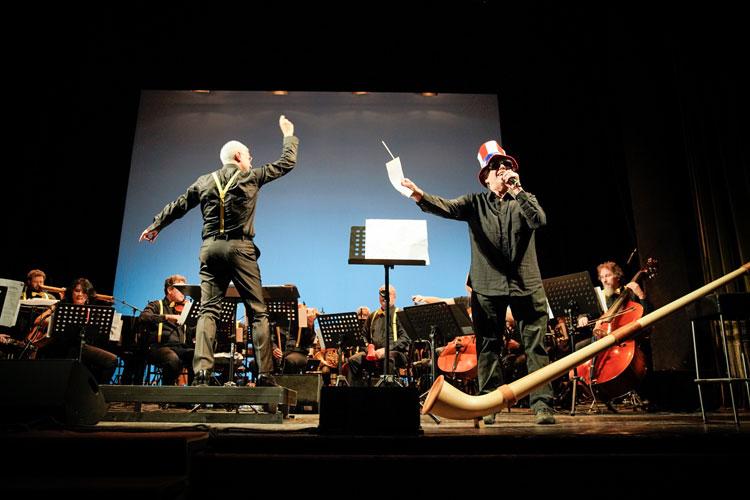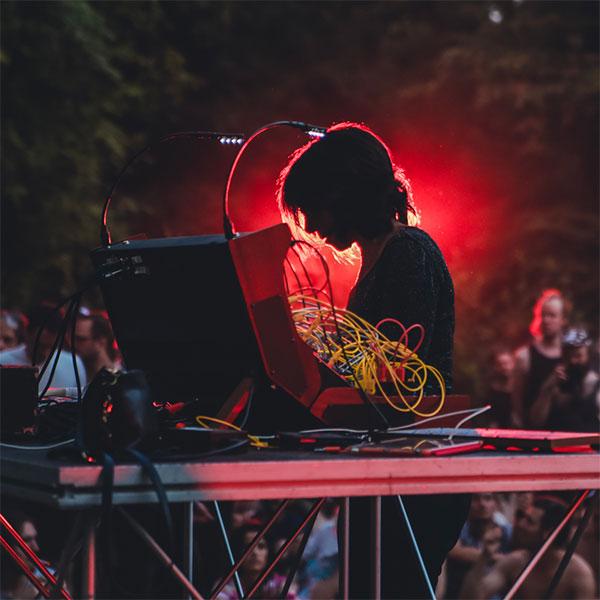Dance, Theatre, Music. From June through October La Biennale di Venezia, chaired by Paolo Baratta, becomes an international festival of live performance and a centre for training and research in the programmes of Marie Chouinard, Antonio Latella, and Ivan Fedele.

Biennale Musica 2018: the crossover between Europe and America
The 62nd Festival, titled Crossing the Atlantic, is dedicated to the musical influences between Europe and the Americas.
The 62nd Festival
Open to a “more up-to-date interpretation of the concept of contemporary”, following the thought of Director Ivan Fedele, and dedicated to the musical influences between Europe and the Americas, the 62nd International Festival of Contemporary Music, titled Crossing the Atlantic, will take place in Venice from September 28th to October 7th.
The Yellow Shark by Frank Zappa, the Golden Lion for Lifetime Achievement to Keith Jarrett, María de Buenos Aires by Astor Piazzolla, Aliados by Sebastian Rivas, the Victor Wooten Trio are just some examples of how every type of music can be enriched by the experience of another, can absorb its lesson and return it in new form.
Performed for the first time in 1992 at the Alte Oper in Frankfurt, Frank Zappa’s masterpiece The Yellow Shark ![]() inaugurates the 62nd Festival in its complete version with the 26 elements of the Parco della Musica Contemporanea Ensemble conducted by Tonino Battista and the participation of David Moss, one of the most original vocalists in the world, who has previously performed Zappa's work. The Yellow Shark is considered the highest synthesis of Frank Zappa’s creative intelligence, the expression of a musical thought that ranges freely across all genres, capable of merging orchestral score and improvisation, experimental rock and academic avant-garde, performance and interpretative detail.
inaugurates the 62nd Festival in its complete version with the 26 elements of the Parco della Musica Contemporanea Ensemble conducted by Tonino Battista and the participation of David Moss, one of the most original vocalists in the world, who has previously performed Zappa's work. The Yellow Shark is considered the highest synthesis of Frank Zappa’s creative intelligence, the expression of a musical thought that ranges freely across all genres, capable of merging orchestral score and improvisation, experimental rock and academic avant-garde, performance and interpretative detail.
From rock to tango, that of another heretic such as Astor Piazzolla, who braces the most popular dance genre in the world with a diversity of instruments, techniques and styles that revolutionize and enrich its expressive range. Also coming to Venice will be Marcelo Nisinman, composer, arranger, conductor and prodigy of the bandoneòn with a new edition of Piazzolla's most famous tango-opera, Maria de Buenos Aires, a story grown out of South-American magic realism, with its characteristic blend of sacred and profane, authored by Uruguayan poet Horacio Ferrer.
With a background in rock and jazz, Sebastian Rivas – the Festival’s Silver Lion – moves easily between digital, acoustic and electronic experimentation: to the Biennale he will bring Aliados, a multimedia opera with sound, images and voices manipulated in real time, for an opera of our time. The work is based on the true story of the meeting between Augusto Pinochet and Margaret Thatcher, the allies mentioned in the title, during the conflict over the Falkland Islands.
Victor Wooten is a wizard of the bass, whose has given an essential contribution to innovation in the performing techniques of an instrument that is critical to every band but has long been considered marginal. Listed as one of the 10 best bassists of all time by “Rolling Stone” magazine and elected bassist of the year three times by the readers of “Bass Player”, Victor Wooten will present the European premiere of his latest CD, Trypnotyx, accompanied by two masterful musicians: drummer Dennis Chambers, session man with Scofield, McLaughlin, Santan, and the saxophonist and flutist Bob Franceschini.
In the ample sphere of music enriched and created by technological devices, the concerts are increasingly moving towards theatre, with interpreter-performers, scenographic soundscapes and immersive installations that transform the stage and the music-listening space: it happens in Nidra by thirty-five year old Giacomo Baldelli, conceived as a multi-sensorial work, “a tour-de-force of contemporary music for electric guitar and video” (New York Times), with pieces that reconnect highbrow music and the subversive energy of rock, such as Trash TV Trance by Fausto Romitelli or Vampyr! by Tristan Murail; and it also happens in Le chant de la matière by Laura Bianchini and Michelangelo Lupone of the Centro di Ricerca Musicale in Rome, who invent large drums made of interactive membranes and a metal shell that can make the secret voice of matter resound like an imposing symphony, projecting its fascinating vibrations onto a screen, with the help of Philippe Spiesser. Or like in the concerts dedicated to the solo double-bass: by Dario Calderone, who will perform Ur, due riti per contrabbasso solo by Giorgio Netti in an amplified version that brings the spectator closer, then farther and finally immerses him into the sound and the instrument; by Florentin Ginot, who presents Not Here, a concert-scenographié in situ according to Ginot himself, where four double-basses are positioned along the four sides of the stage, one for each piece, exploring the entire range of this instrument's sound; by Charlotte Testu, who uses electronic devices to reinvent the instrumental technique of the double-bass. Finally the duo of augmented cellos Norman Adams and Nicola Baroni: in their concerts the score, computational programming and performance blur their traditionally defined contours and ‘virtual’ sound emerges as an effective consequence of the actions that take place on stage.
Applauded as “the diva of avant-garde piano”, Cage and Crumb’s favourite performer, the first to cultivate the art of the toy piano, Margaret Lang Ten brings to the programme of the 62nd Festival the leverage of an artistic biography that has made history. Her concert – with music by Cowell, Cage and Crumb – features the pioneers who have laid the foundations for every linguistic extension of the piano, initiating a process of experimentation with instruments that remains central to this day.
Different styles and generations cross paths in the concerts of the ensembles and quartets invited to the Festival, focused on the dynamic, performing and spatial element of the rendition: the Orchestra Haydn di Bolzano e Trento conducted by Tito Ceccherini, with soloists soprano Giulia Bolcato and violinist Francesco D’Orazio; the Ensemble Linea, founded in 1998 by pianist and conductor Philippe Wurtz, formerly an assistant to Kent Nagano and Peter Eötvös; the Mivos Quartet, founded only 10 years ago in New York and now one of the most energetic performers of contemporary music; the Untref string quartet, founded as recently as 2011, but one of the prime ensembles in Argentina dedicated to music from the second half of the twentieth century to our day.
The Parco della Musica Contemporanea Ensemble will also present a monographic concert dedicated to a great composer such as Elliott Carter, always listening to his own time.
The Festival will present 18 concerts for a total of 40 premiere performances: 18 world premieres, 1 European and 21 Italian premieres.
Biennale College - Musica
The presentation of short musical theatre works proposed by variable teams – this year composer and librettist ages 35 and under – selected via an international call, has now become a recurring event at the Festival. This year submissions were received from four continents: the teams that will be selected will be assisted in the development and production of their projects across four phases of training and production, coordinated by the Director of the Music Department Ivan Fedele with the help of a team of tutors. This year they will include: Sergio Casesi and Giuliano Corti (libretto), Lucia Ronchetti (composition). The tutor for direction will be recommended by the Director of the Theatre Department Antonio Latella.
What’s new
A new feature of the 2018 Festival is the accreditation of “spectators in residence”, which will make it possible to enjoy the full range of events in the Festival of Dance Music and Theatre with the presence of tutor who will guide them in a dedicated experience through the performances and artists of the festivals, encounters with the protagonists and opportunities for dialogue and exchange. The accreditation to one or more of the Festivals may be purchased starting March 15th at the special price of 35 € for each event.
The call for “contributors in residence”, to be published within the next few days, is addressed to young Italian graduates ages 35 and under, and is structured as a process of research on the field with participation in the festival and studies in the Historic Archives of the Biennale. It will be tutored by professionals and supervised by the Directors of the Departments.
We would like to thank the Ministry for the Cultural Heritage and Activities for its significant contribution and the Regione del Veneto for its support to the programmes of the Dance Music and Theatre Departments of the Biennale di Venezia.
The following have contributed to the production of some of the events in the Festival: the Accademia Nazionale di Santa Cecilia (Biennale College – Musica), the Fondazione Musica per Roma (The Yellow Shark by Frank Zappa), and the Accademia Pescarese (María de Buenos Aires by Astor Piazzolla).


